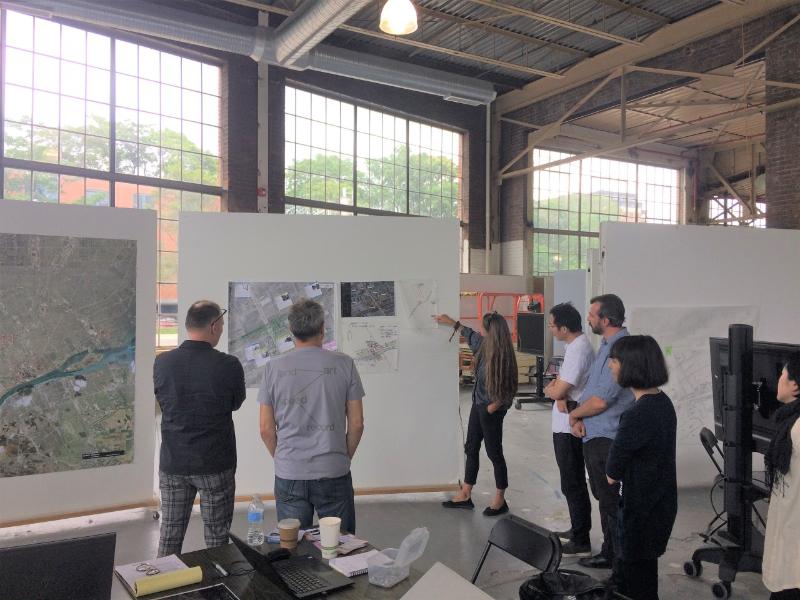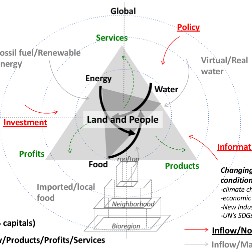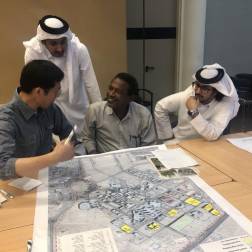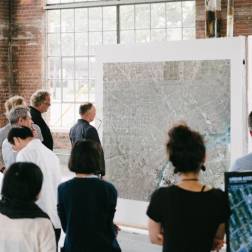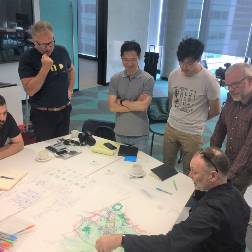The Moveable Nexus: Design-led urban food, water and energy management innovation in new boundary conditions of change
Urban communities are particularly vulnerable to the future demand of food, water and energy, and this is further acerbated by the onset of climate change. A solution needs to be found for a FEW nexus. This internationally diverse project, based around urban design practice, sees urban agriculture as a key facilitator of the Nexus, needing water and energy to become productive. Working directly with living labs in some of the most vulnerable communities in the partner cities, the team aims to co-design new food futures with stakeholders that leave them less vulnerable to forces disturbing the nexus. The lessons learned from these stakeholder workshops will be shared outside the team, so that lessons learned locally can be applied globally.
The M-NEX is designed to have a tremendous impact on a variety of scales, stakeholders and locations. The decision-making tool and platform are developed through intense community-based projects in 6 locations around the world. The research team visits each location to collaborate with the local stakeholders in urban living labs to address and formulate a strategy to tackle local FEW-problems. This approach ensures an applicable strategy that provides value for the local academic community, citizens, end users and commercial parties. The outcomes of each location are analysed and combined into the tool and platform, ensuring that outcomes of this project are transferable and an international impact can be guaranteed.
M-NEX is a granted project of Collaborative Research Area Belmont Forum (no. 11314551), initiated by JPI Europe Urban through the “Sustainable Urbanization Global Initiative—Food-Water-Energy Nexus” programme.
Recent papers published by the Research group:
Keeffe, G. and Cullen, S. (2021) ‘A flexible scaffold: design praxis and the FEW-nexus’, in Roggema, R. (ed.) TransFEWmation: Towards Design-led Food-Energy-Water Systems for Future Urbanisation. Switzerland: Springer Nature. p. 95-106.
Cullen, S. and Keeffe, G. (2021) ‘Spatialised method for analysing the impact of food’, in Roggema, R. (ed.) TransFEWmation: Towards Design-led Food-Energy-Water Systems for Future Urbanisation. Switzerland: Springer Nature. p. 107-124.
Cullen, S. and Keeffe, G. (2020) ‘Effective food: design and urban agriculture in the post-carbon city.’ Planning Post Carbon Cities: 35th PLEA Conference on Passive and Low Energy Architecture, A Coruña. 1st-3rd September 2020: Proceedings. Rodrigez Álvarez, J. & Soares Gonçalves, J. C. (eds.). A Coruña: University of A Coruña & Asoc. PLEA 2020 Planning Post Carbon Cities, Vol. 1. p. 736-742.
Cullen, S., Keeffe, G., Campbell, E. and Logan, K., 2020. ‘End-of-the-line urbanism: reprogramming the FEW-nexus of the city-region for a post carbon society’. Proceedings of the 18th International Conference on Sustainable Energy Technologies (SET 2019) 20-22 August. Kuala Lumpur, Malaysia. Vol. 2. p. 386-394.
The project is led by Dr. Wanglin Yan, Professor, Faculty of Environment and Information Studies, Keio University, Japan under the international consortium with 7 partners from 6 countries:
- Keio University, Japan
- Delft University of Technology, Netherlands
- Institute for Global Environmental Strategies, Japan
- Qatar University, Qatar
- Maccreanor Lavington Architects, UK
- University of Technology Sydney, Australia
- University of Michigan, USA
Goal 2: Zero hunger
Goal 7: Affordable and clearn energy
Goal 11: Sustainable cities and communities
Goal 12: Responsible consumption and production
Goal 13: Climate action

